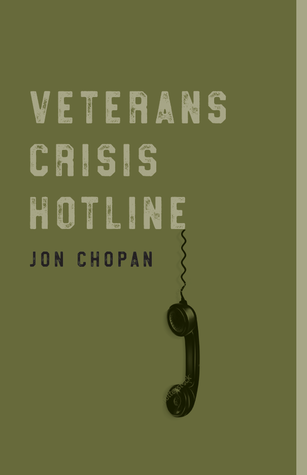VETERANS CRISIS HOTLINE
ABOUTThe twelve stories of Veterans Crisis Hotline offer a meditation on the relationship between war and righteousness and consider the impossible distance between who men are and who they want to be. A veteran working at the hotline listens to the stories men tell when they need someone to hear their voices, when they need to access a language for their pain. Two men search for the head of a decapitated Iraqi civilian so that they might absolve themselves of the atrocities of war, a Marine hunts for the man who raped his girlfriend, and a teenage son replaces his dead father on the battlefield. With a quick wit and offbeat humor, Jon Chopan takes us from the banks of the Euphrates to the bars and VFW halls of the Rust Belt, providing insight into the Iraq War and its enduring impact on those who volunteered to fight in it.
JUDGE'S COMMENT"These twelve stories, each narrated by a different veteran of the Iraq war, divide evenly between the often near-hallucinatory events of that war and the account of life back home in its aftermath. Sometime sad, sometime horrifying, often hilarious—occasionally all three simultaneously—each story bears down on moments of such searing honesty that it lingers in the reader’s memory as urgently as it lives on the page. This is an unsparing, vital, and completely engaging work of art."— Sue Miller
INTERVIEWSQ&A with Jon Chopan by Christine Sneed
CS: These are some of the best short stories I've read in a long while, and also some of the best stories about war and its effects on both soldiers and civilians. How did you decide to write a collection about these characters, all of whom are either soldiers and/or the children of soldiers? JC: It started with the final story in the collection. That’s where I met Tully Fitzsimmons, who I would, after finishing that story, become somewhat obsessed with. It wasn’t that I wanted to write about war, and at first I refused to. I wanted to know what happened to him after he decided to go to Iraq and when he got home from the war. I had no intention of writing the war at all, but at some point the stories froze up, they wouldn’t move, Tully didn’t want to talk about home anymore and needed to talk about the war. Long before that, my most trusted readers told me that I was going to have to write about it, but I refused to believe them until the stories told me that I had no choice. Originally this was a linked story collection all about Tully and his going to war and then his time home. |
PRAISE
"An inherently fascinating, entertaining, thoughtful and thought- provoking read from beginning to end, Veterans Crisis Hotline is unreservedly recommended for personal reading lists, as well as community and academic library Contemporary Literary Fiction collections." -- Midwest Book Review. "Its spare but evocative prose and well-crafted characters make clear why [it won the Grace Paley Prize]. " -- Tampa Bay Times "I’ve long argued that it’s time to replace Stephen Crane’s The Red Badge of Courage as an example of good war literature produced by a civilian. And frankly, there’s no time like the present—in which a fraction of the American society fights on behalf the rest—for a non-veteran to step into the arena. Jon Chopan has achieved this feat with Veterans Crisis Hotline. With great care, he has written outside what he knows, and in doing so proven willing to grapple with societal norms and uncomfortable issues." -- Matthew Komatsu, The Wrath-Bearing Tree. "Jon Chopan has written the book every writer wishes they could have written--stories that are both the fly on the wall, and the beating heart of its characters. The prose moves from raw, unfettered observations, to poetic descriptions that reveal the face behind the mask. Somewhere in the middle, these unforgettable stories take hold, and don't let go." — Katey Schultz, author of Flashes of War and the forthcoming novel Still Come Home "This collection is strongest when it fosters that tension, treating memories of war not as narratives at all, just jumbles of sensations, images, individually indelible, yet enigmatic—not a tale about a buddy’s devotion to the task of slaughter but, rather, a kind of koan, a jarring puzzle of words that reveals how far we are from anything like understanding." -- Spencer Dew, decomP Magazine. |



